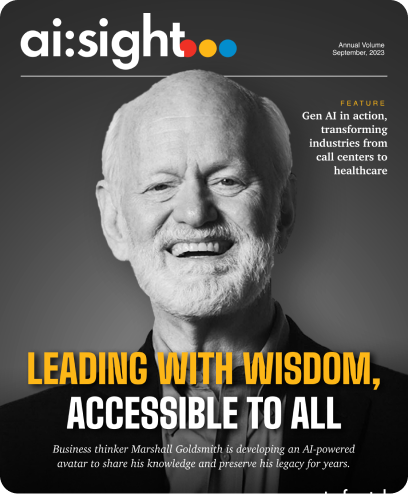Over the past few years, we’ve seen exactly how critical digital transformation and artificial intelligence (AI) are for competitive business. When the pandemic hit, companies like Starbucks, that had invested in digital transformation five years earlier, could immediately jump to a no-contact, no-waiting sales model that ensured business continuity alongside the safety of workers and customers. Others, including McDonald’s and Burger King, moved quickly to emulate that success with similar strategies. However, without the digital maturity of Starbucks, they are still playing catch-up.
So, what prompted Starbucks to embark on digital transformation so early on? It perhaps didn’t foresee a pandemic, but it did see disruption, and a need to disrupt its markets, as the rise in online shopping brought changes in consumer behavior. Its transformation journey has been characterized by customer-centric innovation and preparation to handle rapid changes affecting its industry.
Today, boards of directors in every industry and geography face a similar challenge: envisioning and inspiring their management on how digital transformation can add value for the business and its stakeholders while protecting the organization from risks.
“The board is the one set of people who are expected to lead the company forward or to provoke senior management and help them gauge the company’s position and progress in digital transformation.”

Pranay Agrawal
Co-founder and Chief Executive Officer of Fractal
However, through our conversations with board members, we have found that they often don’t feel well equipped to do that. Since boards are not responsible for planning and execution, they face a unique, two-pronged challenge.
“Successful leadership requires thorough preparation, high standards, and conviction,” said Deb Henretta, an executive advisor on digital transformation. “To maximize their impact on management, boards need to be thoughtful and considered in their questions and contributions and to listen as much as they contribute.”
“When it comes to directing digital transformation, boards often feel they lack two key elements they need to deliver that leadership. First, they require a detailed understanding of transformation and its relevance to the company and industry they serve. In addition, they need an effective way to communicate that understanding that stimulates the company’s management to develop effective strategies. To do that, they must know exactly what they can do – which ideas to suggest, which questions to ask, and where there are real-world examples to explore – to provoke productive thought among managers about the areas they need to work on. A board that successfully communicates an informed transformation vision in this way is helping the company to make that journey.”

Deb Henretta
Executive Advisor on Digital Transformation
There is no shortage of programs aimed at helping leaders to understand digital transformation. However, they often fall short of the board directors’ unique needs. Many require a time commitment that directors struggle to afford – courses offered by the university and academic institutions require in-person attendance for anything from one day to sixteen days, while even self-paced online courses can require several hours per week over multiple weeks. And for those that can attend, the available programs often don’t cover everything that directors need to know.
“Many of the available courses lack the breadth and depth that boards of directors are looking for,” said Sagar Shah, client partner, Strategic Center at Fractal. “Some are very academic, focusing on the principles and tenets of digital transformation. Others use case studies to illustrate the concepts of digital transformation. Still, they don’t explain how it was done, how long it took, what type of investment was involved, or exactly which programs brought the company’s success.”
So, what do directors want from a digital transformation education program?
Answering, as well as asking challenging questions, is a must. For example, how can digital help a company disrupt its industry, engage meaningfully with customers, or drive social good? How can it help a major bank generate more leads, or a government organization engages with more than a billion citizens in multiple languages? And how might a Fortune 500 company harness AI to increase earnings by more than $500 million through better revenue and supply chain management?
Ultimately, boards need the tools at their disposal to inspire change that creates value.
“One of the greatest challenges for leaders in any industry is engaging their people to drive change rather than be run over by it,” said Mark C. Thompson, a world-leading CEO coach. “Transformation isn’t just about applying technology. It’s about driving change, growth, and a culture of value creation.”
“To provide actionable ideas and insight that provoke a sense of urgency, along with the checks and balances to protect reputation and performance, boards must be able to connect their transformation vision with a spectrum of elements. These include company values and culture, market trends, analyst and customer sentiment, operational knowledge of how other organizations have achieved similar goals, and everything in between. The breadth and depth of knowledge needed might seem overwhelming. Still, a board program focused on helping the company explore its unique challenges should be able to deliver the laser-targeted insights and resources within a day or, for individual issues, hours.”

Mark C. Thompson
World-leading CEO coach
Fractal’s understanding of the operational insight needed to explore those questions comes from more than 20 years of working with hundreds of Fortune 500 companies to enable such transformations. This deep operational experience, coupled with a core belief in the value of sharing knowledge and learning from others, has created a flexible program that can be configured to board directors’ priorities and time availability. They may want a full-day program covering a range of tough questions in depth, for instance, or a shorter meeting where board members come together to discuss complex topics. Where C-level management grapples with a single hot topic – such as sustainability or ethics – a 90-minute roundtable is often the perfect format.
“Sustainability and ethics are two prime topics that boards are struggling with today because of the changing nature of laws and regulations in the US, UK, Europe, China, and India,” said Shah. “We can also address other topics that are top of mind with directors, such as cyber risk and security, cyber insurance, and governance models across the organization. Metaverse is also gaining interest – for example, if companies follow PNG’s example and hire a chief Metaverse officer reporting to the CEO, those CEOs may want to attend a roundtable where they can learn about the subject.”

Sagar Shah
Strategic Center, Fractal
This ability to respond to new challenges is crucial. Digital transformation is a journey, not a destination, and boards may need to re-examine goals and directions along the way. A program focusing on directors’ changing requirements may prove essential to deliver long-term value as new challenges and opportunities emerge.
“Our board digital program is one of the many ways we create value for our clients across the life cycle of their transformation journey,” said Pranay. “We build long-term relationships with our clients and help them achieve complex goals using AI engineering and design. Bringing that deep expertise to help their boards become more effective is one of the major ways we can create value for them.”
64%of boards have made efforts to significantly alter the enterprise economic structure to a more digital economic architecture. Source: Gartner, 2022
50%+of consumers believe the organization providing or using the AI should be held accountable if AI goes wrong. Source: Gartner
94%of directors said they felt they needed more training on new technology and governance best practices, and just 58% reported receiving that training. Source: Harvard Business Review
Contributors

Pranay Agrawal
Co-founder and Chief Executive Officer, Fractal

Deb Henretta
Executive Advisor on Digital Transformation

Sagar Shah
Client Partner, Strategic Center, Fractal

Mark C. Thompson
World-leading CEO coach







